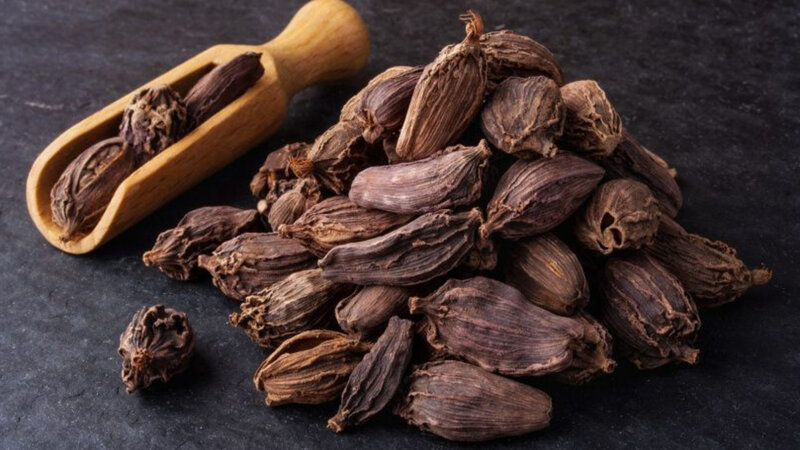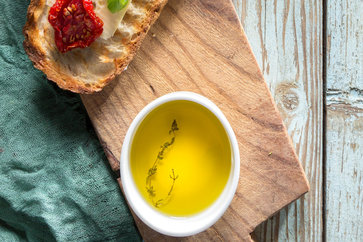Badi Elaichi (Black Cardamom) Health Benefits & Side Effects
Black Cardamom, commonly known as Badi Elaichi or Kali Elaichi in Hindi, and as Brihad Ela or Sthula Ela in Sanskrit, is a powerful Indian spice with deep Ayurvedic roots. Scientifically known as Amomum subulatum, it also goes by several other names including Bengal cardamom, hill cardamom, greater cardamom, winged cardamom, Nepal cardamom, and brown cardamom.

Unlike the sweet, floral green cardamom, black cardamom has a bold, smoky aroma with hints of camphor or mint, making it especially popular in savory dishes. Though some consider it less refined than green cardamom, this notion is far from true. In Ayurveda and traditional medicine, Badi Elaichi holds immense importance.
Its benefits go beyond culinary use—it is revered for promoting health, aiding digestion, supporting respiratory wellness, and even helping with skin and hair care. Truly, this spice is a holistic powerhouse in both the kitchen and the medicine cabinet.
Types of Cardamom
Cardamom comes in a few different types, each with unique characteristics and uses. The main types are:
1. Green Cardamom (Elettaria cardamomum)
- Also known as: True cardamom
- Appearance: Small green pods with tiny black seeds inside
- Flavor: Sweet, floral, slightly spicy
- Uses: Widely used in Indian, Middle Eastern, and Scandinavian cuisines, especially in desserts, chai tea, curries, and spice blends like garam masala
2. Black Cardamom (Amomum subulatum)
- Also known as: Brown cardamom, Nepal cardamom
- Appearance: Larger pods, dark brown to black with a rough, wrinkled surface
- Flavor: Smoky, earthy, bold
- Uses: Often used in savory dishes like biryani, stews, and hearty curries; not typically used in sweets
3. White Cardamom
- What it is: Bleached green cardamom (sometimes used interchangeably)
- Appearance: Pale or white pods
- Flavor: Milder than green cardamom
- Uses: Common in Scandinavian baking and sometimes used where a less intense flavor is needed
4. Madagascar or Round Cardamom (Aframomum spp.)
- Appearance: Rounder and larger pods
- Flavor: More citrusy or peppery than true cardamom
- Uses: Regional uses in African cuisines
Indian Name for (Badi Elaichi) Black Cardamom
- Bengali: Badh elach
- Gujarati: Elcha
- Hindi: Badi elaichi
- Kannada: Dodda elakki
- Sanskrit: Brihad ela/ Sthula ela
- Tamil: Peria Elam
- Telugu: Tengu elakulu
- Marathi: Velchi
- Tamil: Elakkai
- Malayalam: Elakkai
Cardamom in Different Languages
- English: Black cardamom, Greater cardamom, Nepal cardamom
- French: Cardamome
- German: Kardamom
- Italian: Cardamomo, Cardamone
- Spanish: Cardamomo
- Burmese: Phalazee
- Chinese: Ts’ao-k’ou
- Indonesian: Kapulaga
- Malay: Buah pelaga
- Sinhalese: Enasal
- Thai: kravan
Badi Elaichi In Ayurveda
Badi Elaichi (Black Cardamom) is a valued spice in Ayurveda, used traditionally to treat various ailments. Its therapeutic properties have made it a go-to remedy for:
- Respiratory issues like cough and cold (Kasa)
Its warming nature helps clear mucus and ease breathing. - Itching and skin irritations (Kandu)
Its detoxifying properties soothe the skin and reduce irritation. - Urinary tract disorders (Vastiroga)
It promotes healthy urination and supports kidney function. - Throat problems, including sore throat (Kantaruja)
It acts as a natural expectorant and soothes throat inflammation.
According to Ayurvedic principles, Badi Elaichi is:
- Easy to digest (Laghu)
It supports gut health without overwhelming the digestive system. - Moisture-absorbing (Ruksha)
Helps in balancing excess bodily fluids and dampness. - Helpful in reducing fat deposits
It supports metabolism and aids in weight management.
Ayurvedic Properties of Badi Elaichi
- Taste (Rasa): Tikta (Bitter), Katu (Pungent)
These tastes stimulate appetite and improve digestion. - Qualities (Guna): Ruksha (Dry), Laghu (Light)
They make it ideal for clearing congestion and toxins. - Post-digestive effect (Vipaka): Katu (Pungent)
Continues its detoxifying effect even after digestion. - Potency (Veerya): Ushna (Hot)
Provides warmth and enhances circulation.
Effect on Doshas:
- Increases Pitta (Pitta vardhaka)
Should be used with caution by those with high Pitta. - Reduces Kapha and Vata (Kapha-Vata shamaka)
Brings balance during cold, dry, or sluggish conditions.
Cardamom Medicinal Uses
Black Cardamom is widely used in the preparation of several kinds of food, drinks, medicine, etc. It is also known to contain powerful antioxidants. Black cardamom’s health benefits offer protection against countless health conditions, like cancer and blood pressure. Below are some of the health benefits of Badi elaichi and its medicinal uses.
1. Relieves Respiratory Issues
Badi Elaichi is renowned in Ayurveda for its potent effects on the respiratory system. Its warming properties help to clear mucus and phlegm from the lungs, making it beneficial for conditions like cough, cold, asthma, and bronchitis. The spice acts as a natural expectorant, facilitating the expulsion of mucus and easing breathing. Additionally, its antimicrobial properties help combat respiratory infections, reducing inflammation in the airways. Regular consumption can strengthen the respiratory system, improve lung function, and provide relief from chronic respiratory conditions. Whether consumed in tea or as part of a spice blend, Badi Elaichi offers a natural remedy for maintaining respiratory health.
2. Improves Digestion
In Ayurvedic medicine, Badi Elaichi is considered a powerful digestive aid. It stimulates the digestive fire (Agni), enhancing the body’s ability to break down and assimilate food. The spice alleviates common digestive issues such as indigestion, bloating, and gas by promoting the secretion of digestive enzymes. Its carminative properties help in expelling trapped gas, reducing abdominal discomfort. Moreover, Badi Elaichi has been shown to improve appetite, making it useful for individuals experiencing loss of appetite due to illness or stress. By balancing the digestive system, it supports overall gastrointestinal health and well-being.
3. Soothes Throat Infections
Badi Elaichi possesses natural anti-inflammatory and antimicrobial properties, making it effective in treating throat infections. It helps reduce inflammation and irritation in the throat, providing relief from soreness and hoarseness. The spice also acts as a natural expectorant, aiding in the expulsion of mucus and phlegm, which can alleviate coughing and congestion. Regular consumption can soothe the throat lining, reduce swelling, and promote faster healing. Whether used in herbal teas or as part of a gargle solution, Badi Elaichi offers a natural remedy for throat discomfort and infections.
4. Treats Skin Irritations
In Ayurveda, Badi Elaichi is valued for its detoxifying and anti-inflammatory properties, which can help treat various skin irritations. The spice aids in purifying the blood, removing toxins that may contribute to skin issues such as acne, rashes, and eczema. Its antimicrobial properties help prevent infections, while its anti-inflammatory effects reduce redness and swelling associated with skin conditions. Applying a paste of ground Badi Elaichi mixed with honey or water can soothe irritated skin and promote healing. Regular internal consumption can also support overall skin health by addressing underlying imbalances.
5. Supports Urinary Health
Badi Elaichi is beneficial for maintaining urinary tract health in Ayurveda. It acts as a natural diuretic, promoting increased urine production and helping flush out toxins from the body. This diuretic effect can aid in preventing urinary tract infections (UTIs) and kidney stones by ensuring regular urination and reducing the risk of bacterial growth in the urinary tract. Additionally, Badi Elaichi’s anti-inflammatory properties help soothe the urinary system, reducing discomfort during urination. Incorporating this spice into the diet can support overall urinary health and function.
6. Boosts Appetite
In Ayurvedic practice, Badi Elaichi is used to stimulate the digestive system and enhance appetite. Its pungent and bitter taste activates the digestive fire (Agni), promoting the secretion of digestive enzymes and juices. This stimulation leads to increased hunger and improved digestion. The spice is particularly beneficial for individuals experiencing loss of appetite due to illness, stress, or digestive disorders. Regular consumption can help restore normal appetite levels, ensuring adequate nutrient intake and supporting overall health. Whether added to meals or consumed as part of a herbal remedy, Badi Elaichi can aid in appetite regulation.
7. Reduces Fat Accumulation
Badi Elaichi is considered a valuable spice in Ayurvedic weight management practices. Its diuretic properties help reduce water retention, leading to a decrease in bloating and a feeling of lightness. The spice also stimulates metabolism, aiding in the efficient breakdown of fats and preventing their accumulation. Additionally, Badi Elaichi’s ability to balance the doshas, particularly Kapha, supports the body’s natural fat-burning processes. Incorporating this spice into the diet, along with a balanced lifestyle, can assist in maintaining a healthy weight and preventing obesity-related complications.
8. Relieves Headaches
In Ayurveda, Badi Elaichi is used as a natural remedy for headaches and migraines. Its cooling and soothing properties help alleviate tension and reduce the intensity of headaches. The spice can be applied topically in the form of a paste made from ground Badi Elaichi and water to the forehead or temples to provide relief. Inhaling the aroma of Badi Elaichi can also have a calming effect on the nervous system, reducing stress-induced headaches. Regular use may help prevent the recurrence of headaches by promoting overall balance and well-being.
9. Promotes Oral Health
Badi Elaichi has been traditionally used in Ayurveda to promote oral health. Its antimicrobial properties help combat bacteria in the mouth, reducing the risk of dental issues such as bad breath, gum disease, and cavities. The spice also acts as a natural breath freshener, leaving the mouth feeling clean and refreshed. Chewing on a small piece of Badi Elaichi after meals can stimulate saliva production, which aids in neutralizing acids and maintaining oral hygiene. Regular use can contribute to overall oral health and hygiene.
10. Balances Doshas
In Ayurvedic philosophy, Badi Elaichi is known for its ability to balance the body’s doshas—Vata, Pitta, and Kapha. Its warming and stimulating properties help pacify Vata and Kapha doshas, which are associated with cold and damp conditions in the body. By balancing these doshas, Badi Elaichi can help alleviate symptoms such as fatigue, poor digestion, and excess mucus production. However, due to its Pitta-aggravating qualities, it should be used cautiously in individuals with a Pitta constitution or those experiencing conditions like acidity or inflammation. When used appropriately, Badi Elaichi supports overall health and harmony within the body.
Badi Elaichi Side Effects
In most cases, Black cardamom is found safe to use when taken by mouth. In a few cases, some people may have black cardamom side effects, but not major, it is generally found in excess of intake below are some of them.
- Respiratory Problems: Due to excess intake of black cardamom some may experience respiratory problems such as difficulty in breathing, shortness of breath tightness in the chest, etc.
- Skin Problems: People sensitive to cardamom can have problems related to their skin. The problems such as swelling of the skin, it is mostly found aggravated in the winter season.
- Interactions of drugs: It is the most common side effect found in most cases. People unknowingly experience as some spices have a tendency to react to a few medicines. So people taking medicines such as Anticoagulants, Liver medicines, Antidepressants, Aspirin, and Anti-platelet drugs must take advice from their doctor.
- Gallstones: The person with stones must not take cardamom in amounts greater than cardamom spice seed can trigger gallstone colic.
- Hyperactivity: The person suffering from hyperacidity must minimize the use of cardamom as excessive use can cause hyperactivity and mouth ulcers.
How to use Badi elaichi: Cardamom starts losing its aroma and flavor as soon as it is ground. So it is better to buy cardamom pods and cook with the whole or crushed or grinds pods during use.


























Cardamom is an ancient spice, existing in India more than a thousand years before the birth of Christ. It is the third most expensive spice, after saffron and vanilla.